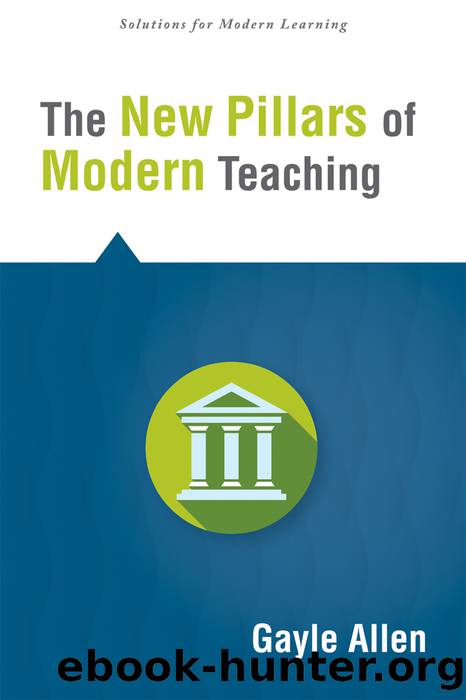The New Pillars of Modern Teaching by Allen Gayle;

Author:Allen, Gayle;
Language: eng
Format: epub
Publisher: Solution Tree
Published: 2015-08-15T00:00:00+00:00
Curation in Action: Programmers
Computer programmers are the new rock stars of the knowledge economy. There are more than one million software developers in the United States, and that job market is expected to grow by a dizzying 22 percent over the next decade (Bureau of Labor Statistics, 2014b). Their median pay in 2012 was almost $95,000 per year, with many earning higher amounts straight out of college. The best programmers receive weekly calls and emails from recruiters hoping to lure them with promises of more money and better perks, with talent agencies such as 10x advertising unabashedly that âthe very best programmers are superstarsâ (Widdicombe, 2014). While many of us might be tempted to think that programmers still fit the media stereotype of geeks toiling away in obscurity, developers such as Google founders Sergey Brin and Larry Page are among the most recognizable faces in the world.
These elite developersâ secret is their commitment to learning, and a major driver of that learning is curation. Developers are voracious consumers (and producers) of content. Change is built into the fieldâs DNAânew programming languages, coding techniques, operating systems, features, architecture, storage methods, and capabilitiesâand good programmers are relentless in their desire to stay up-to-date on how technologies are evolving. A quick glance at the statistics surrounding Stack Overflowâan online forum where programmers gather to discuss their craftâshows that the site receives over fifty-million unique visitors per month. Perhaps even more mind blowing, over 92 percent of programming questions posted on the site are answered in a median time of just eleven minutes (Mamykina, Manoim, Mittal, Hripcsak, & Hartmann, 2011).
We may wonder why educators should care about programmersâ work, but there are at least two important connections between us.
1. We are both learning workers in fields undergoing transformation and disruption: For programmers, itâs the evolution and improvement of coding languages; for educators, itâs the new pedagogical approaches created through increased abundance and access.
2. Programmers represent a prototypical example of the kinds of jobs available to 21st century graduates: Therefore, the skills they need to stay competitive are the kinds of skills our students need now and after they graduate, no matter which field they pursue.
Traditional approaches to curriculum born in the era of the Carnegie Unit canât begin to provide content with the speed, variety, and agility these kinds of learners need. Thatâs not to say that programmers never take a workshop or a course or earn a degree. They do those things all the time. Itâs just that they realize that by the time the class is over, some of what theyâve learned is probably already outdated. Thatâs what keeps them curating. They need to know which languages are becoming more popular, which new approaches to coding save the most time, and what other changes are shifting their field. And these changes are not limited strictly to programming languages. The best developers monitor fields such as data science, design, and visualization to augment their skills.
So how do they do it? Itâs a process of trial and error that acknowledges at the start that they donât have all the answers.
Download
This site does not store any files on its server. We only index and link to content provided by other sites. Please contact the content providers to delete copyright contents if any and email us, we'll remove relevant links or contents immediately.
Deep learning with TensorFlow and Keras by Derrick mwiti(830)
Understanding PDA Autism in Kids: A Guide for Parents and Teachers to Support Neurodiverse Learners by Jehu Len(585)
The Victorian Era: A Captivating Guide to the Life of Queen Victoria and an Era in the History of the United Kingdom Known for Its Hierarchy-Based Social Order by Captivating History(448)
Brain Teasers to Build Critical Thinking Skills by Safarova Kris(421)
Brain Teasers to Build Critical Thinking Skills: Brain Exercises for Tech, Banking, Case Interview Prep, and to Keep Your Mind Sharp by Kris Safarova(421)
100 Ideas for Secondary Teachers: Engaging Parents by Janet Goodall & Kathryn Weston(394)
Python 101 - Fundamentals by Sam(380)
Critical Curriculum Leadership : A Framework for Progressive Education by Rose M. Ylimaki(375)
Writing Solid Code: Development Philosophies for Writing Bug-Free Programs by Steve Maguire(365)
Intersectionality in Educational Research by Dannielle Joy Davis; James L. Olive; Rachelle J. Brunn-Bevel; Susan R. Jones(345)
The Art of Emotional Validation: Improve Your Communication Skills and Transform Your Relationships by Validating Emotions and Feelings by Emily Wright(342)
The Knights Templar: An Enthralling History of the Rise and Fall of the Most Influential Catholic Military Order by Wellman Billy(338)
A Beginner's Guide to SSD Firmware by Unknown(335)
The Future Knowledge Compendium by Ellyard Peter;(325)
How to be assertive in any situation by Hadfield Sue & Hasson Gill(320)
Making Connections in and Through Arts-Based Educational Research by Hala Mreiwed Mindy R. Carter Sara Hashem Candace H. Blake-Amarante(316)
What Every Teacher Should Know about Learning, Memory, and the Brain by Tileston Donna E. Walker;(314)
Foundations of Educational Research by Victoria Elliott(310)
Message from the Pleiades; The Contact Notes of Eduard Billy Meier v1 only by unknow(307)
